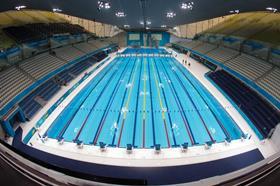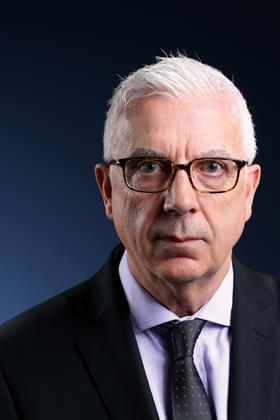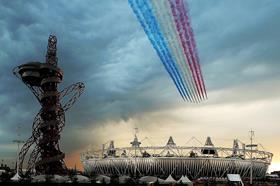Exclusive: UK’s largest contractor admits using blacklisting organisation to check on 12 prospective Olympic employees

Workers bidding to work on the London 2012 Olympic Games for Balfour Beatty were subject to blacklist checks, the firm has admitted.
Building can reveal a letter sent to Olympic Delivery Authority (ODA) chief executive Dennis Hone from Balfour Beatty construction chief executive Mike Peasland (pictured below) said the firm, which built the Olympic aquatics centre, used the services of blacklisting organisation the Consulting Association (TCA) in 2008 to check on 12 prospective Olympics workers, all of whom were later employed.
This follows the claim made by former TCA chief officer Ian Kerr in November before a Commons committee that Balfour Beatty, Sir Robert McAlpine and “possibly Skanska” were involved in Olympics blacklisting.

Peasland’s admission was seized on by shadow business secretary Chuka Umunna who called on the government to carry out an “urgent and full” investigation into recent and potentially current blacklisting.
“Balfour Beatty’s letter indicates what many had long suspected – that blacklisting checks with TCA were carried out on workers employed on Olympics construction sites,” he said.
“It is totally unacceptable that public money was used on projects where blacklisting checks were carried out. The ODA needs to explain what action, if any, was taken in relation to suppliers after the blacklisting scandal came to light in 2009.”
Hone recently wrote to Balfour Beatty, the UK’s largest contractor, and the two other contractors named by Kerr seeking “assurance” that the companies did not conduct Olympics blacklist checks.
In his December reply to Hone, Peasland said Balfour Beatty – which also worked on Olympics roads and bridges and other schemes – had carried out an internal review but found “no evidence” that the checks resulted in denial of employment. Peasland added that the firm had also found no evidence that “it sought or received payment from the ODA for the cost of any checks” and said Balfour Beatty had not used TCA or “any similar organisation” since it was shut down in February 2009.
Skanska’s reply, from its HR vice president Harvey Francis, denied involvement in Olympics blacklisting. Tony Aikenhead, director of operations at Sir Robert McAlpine – which built the Olympic stadium – wrote in his reply that the contractor “was not involved in any blacklisting (by which I mean discrimination against individuals which would prevent them gaining employment) at the Olympic stadium”.
The letters (attached, right) were revealed to Building by London Assembly member John Biggs, who has been investigating the issue.
An ODA spokesperson said it had seen no evidence individuals were denied work or public money was spent on blacklisting checks.
He added the ODA “placed good industrial relations and employees’ welfare at the heart of our work”.

Mike Peasland, Balfour Beatty:
“In 2008, we used the Consulting Association (TCA) in connection with the engagement of 12 operatives. All 12 operatives concerned were employed after our check. We found no evidence of checks being made with TCA resulting in the denial of employment.
“We found no evidence of any other use of TCA in connection with Olympic projects.”
Tony Aikenhead, Sir Robert McAlpine:
“Sir Robert McAlpine limited was not involved in any blacklisting (by which I mean discrimination against individuals which would prevent them gaining employment) at the Olympic stadium.”
Harvey Francis, Skanska:
“Our investigation found no evidence that Skanska used TCA on any Olympic project and nor did Skanska use any other form of so-called blacklist or covert means of checking those who were allowed on site in relation to any Olympic project.”
Dennis Hone, Olympic Delivery Authority chief executive:
“Our inquiries have not found any indication that any individuals were denied work on the Olympic Park and other ODA projects as a result of the use of vetting checks, nor that any evidence of potential or actual blacklisting was ever supplied to the ODA by unions or individuals.
“The ODA placed good industrial relations and workers’ welfare at the heart of our construction project … It is a matter of regret to us that this immensely positive record appears to be being undermined by unsubstantiated claims made after the completion not just of the construction programme, but the whole London 2012 Olympics and Paralympic Games – rather than in a timely way when the ODA still had contractual and working relationships with contractors and when any evidenced unacceptable practices could have been addressed.”
Shadow business secretary Chuka Umunna:
“Balfour Beatty’s letter indicates what many had long suspected – that blacklisting checks with the Consulting Association were carried out on workers employed on Olympic Construction sites.
“It is totally unacceptable that public money was used on projects where blacklisting checks were carried out. It raises questions over how widespread the practice of blacklisting was and the extent to which it still exists. It also underlines the urgent need for a fuller and deeper investigation of blacklisting allegations by government departments and agencies.
“The admission by this company that blacklisting checks were carried out on workers on public projects directly contradicts what ministers have said in response to my parliamentary questions on blacklisting in relation to Olympic contracts.”
“The ODA needs to explain what action, if any, was taken in relation to suppliers after the blacklisting scandal came to light following the ICO raid on the Consulting Association took place in 2009.”
Downloads
Biggs-Hone letters
PDF, Size 0 kbContractors' letters
PDF, Size 0 kb




























1 Readers' comment